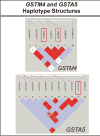Glutathione pathway genetic polymorphisms and lung cancer survival after platinum-based chemotherapy
- PMID: 20200426
- PMCID: PMC2837367
- DOI: 10.1158/1055-9965.EPI-09-0871
Glutathione pathway genetic polymorphisms and lung cancer survival after platinum-based chemotherapy
Abstract
Background: Lung cancer is commonly treated with platinum compounds. The "glutathione pathway" participates in the metabolism of platinum compounds. We set out to test the hypotheses that single nucleotide polymorphisms (SNPs) or copy number polymorphisms for genes within the glutathione pathway might influence survival in lung cancer patients treated with these drugs.
Methods: Germline DNA samples from 973 lung cancer patients were genotyped for 290 glutathione pathway SNPs. GSTT1 copy number was also assayed. We determined the association of these polymorphisms with survival for lung cancer patients, followed by functional genomic validation.
Results: We observed suggestive associations between survival and GSTT1 copy number (P = 0.017), and GSTA5, GSTM4, and ABCC4 SNPs, adjusted for covariates (P = 0.018, 0.002, and 0.002, respectively) or not (P = 0.005, 0.011, and 0.002). One hundred lymphoblastoid cell lines were then treated with cisplatin, and IC(50) values were significantly associated with the GSTM4 SNP (P = 0.019). Furthermore, GSTM4, GSTT1, and ABCC4 overexpression significantly decreased cisplatin sensitivity in lung cancer and HEK293T cell lines.
Conclusions: These results suggest that GSTM4 polymorphisms are biomarkers for the prediction of cisplatin response. ABCC4 polymorphisms, as well as GSTT1 copy number, may also help to predict cisplatin response, but further validation is required. These results represent a step toward the individualized chemotherapy of lung cancer.
Conflict of interest statement
Figures





References
-
- Kelland L. The resurgence of platinum-based cancer chemotherapy. Nat Rev Cancer. 2007;7:573–84. - PubMed
-
- Cisplatin Reed E, Carboplatin, Oxaliplatin . In: Cancer Chemotherapy and Biotherapy. Chabner B, editor. Lippincott Williams & Wilkins; 2006. pp. 332–343.
-
- Rosenberg B, Vancamp L, Krigas T. Inhibition of Cell Division in Escherichia Coli by Electrolysis Products from a Platinum Electrode. Nature. 1965;205:698–9. - PubMed
-
- Schiller JH, Harrington D, Belani CP, et al. Comparison of four chemotherapy regimens for advanced non-small-cell lung cancer. N Engl J Med. 2002;346:92–8. - PubMed
-
- Eastman A. Characterization of the adducts produced in DNA by cis-diamminedichloroplatinum(II) and cis-dichloro(ethylenediamine)platinum(II) Bioc - PubMed
Publication types
MeSH terms
Substances
Grants and funding
- R01 CA115857/CA/NCI NIH HHS/United States
- U01 GM61388/GM/NIGMS NIH HHS/United States
- R01 CA084354/CA/NCI NIH HHS/United States
- R01 GM028157/GM/NIGMS NIH HHS/United States
- R01 CA80127/CA/NCI NIH HHS/United States
- R01 CA84354/CA/NCI NIH HHS/United States
- R03 CA77118/CA/NCI NIH HHS/United States
- R03 CA077118/CA/NCI NIH HHS/United States
- T32 GM072474/GM/NIGMS NIH HHS/United States
- U01 GM061388/GM/NIGMS NIH HHS/United States
- R01 CA080127/CA/NCI NIH HHS/United States
- R01 CA132780/CA/NCI NIH HHS/United States
- R01 GM28157/GM/NIGMS NIH HHS/United States
LinkOut - more resources
Full Text Sources
Other Literature Sources
Medical
Molecular Biology Databases

